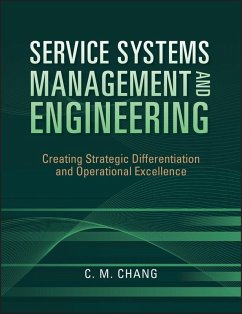Service Systems Management and Engineering (eBook, ePUB)
Creating Strategic Differentiation and Operational Excellence


Alle Infos zum eBook verschenken

Service Systems Management and Engineering (eBook, ePUB)
Creating Strategic Differentiation and Operational Excellence
- Format: ePub
- Merkliste
- Auf die Merkliste
- Bewerten Bewerten
- Teilen
- Produkt teilen
- Produkterinnerung
- Produkterinnerung

Hier können Sie sich einloggen

Bitte loggen Sie sich zunächst in Ihr Kundenkonto ein oder registrieren Sie sich bei bücher.de, um das eBook-Abo tolino select nutzen zu können.
The ultimate instructional guide to achieving success in the service sector Already responsible for employing the bulk of the U.S. workforce, service-providing industries continue to increase their economic dominance. Because of this fact, these companies are looking for talented new service systems engineers to take on strategic and operational challenges. This instructional guide supplies essential tools for career seekers in the service field, including techniques on how to apply scientific, engineering, and business management principles effectively to integrate technology into the…mehr
- Geräte: eReader
- mit Kopierschutz
- eBook Hilfe
- Größe: 5.66MB
![Essentials of Project and Systems Engineering Management (eBook, ePUB) Essentials of Project and Systems Engineering Management (eBook, ePUB)]() Howard EisnerEssentials of Project and Systems Engineering Management (eBook, ePUB)135,99 €
Howard EisnerEssentials of Project and Systems Engineering Management (eBook, ePUB)135,99 €![Making Sense of Agile Project Management (eBook, ePUB) Making Sense of Agile Project Management (eBook, ePUB)]() Charles G. CobbMaking Sense of Agile Project Management (eBook, ePUB)59,99 €
Charles G. CobbMaking Sense of Agile Project Management (eBook, ePUB)59,99 €![What Executives Need to Know About Project Management (eBook, ePUB) What Executives Need to Know About Project Management (eBook, ePUB)]() International Institute for LearningWhat Executives Need to Know About Project Management (eBook, ePUB)35,99 €
International Institute for LearningWhat Executives Need to Know About Project Management (eBook, ePUB)35,99 €![What Functional Managers Need to Know About Project Management (eBook, ePUB) What Functional Managers Need to Know About Project Management (eBook, ePUB)]() International Institute for LearningWhat Functional Managers Need to Know About Project Management (eBook, ePUB)30,99 €
International Institute for LearningWhat Functional Managers Need to Know About Project Management (eBook, ePUB)30,99 €![Complexity Theory and Project Management (eBook, ePUB) Complexity Theory and Project Management (eBook, ePUB)]() Wanda CurleeComplexity Theory and Project Management (eBook, ePUB)109,99 €
Wanda CurleeComplexity Theory and Project Management (eBook, ePUB)109,99 €![Making Effective Business Decisions Using Microsoft Project (eBook, ePUB) Making Effective Business Decisions Using Microsoft Project (eBook, ePUB)]() AdvisiconMaking Effective Business Decisions Using Microsoft Project (eBook, ePUB)70,99 €
AdvisiconMaking Effective Business Decisions Using Microsoft Project (eBook, ePUB)70,99 €![Value-Driven Project Management (eBook, ePUB) Value-Driven Project Management (eBook, ePUB)]() Harold KerznerValue-Driven Project Management (eBook, ePUB)35,99 €
Harold KerznerValue-Driven Project Management (eBook, ePUB)35,99 €-
-
-
Dieser Download kann aus rechtlichen Gründen nur mit Rechnungsadresse in A, B, BG, CY, CZ, D, DK, EW, E, FIN, F, GR, HR, H, IRL, I, LT, L, LR, M, NL, PL, P, R, S, SLO, SK ausgeliefert werden.
- Produktdetails
- Verlag: John Wiley & Sons
- Seitenzahl: 720
- Erscheinungstermin: 5. Januar 2018
- Englisch
- ISBN-13: 9781119507543
- Artikelnr.: 52556312
- Verlag: John Wiley & Sons
- Seitenzahl: 720
- Erscheinungstermin: 5. Januar 2018
- Englisch
- ISBN-13: 9781119507543
- Artikelnr.: 52556312
- Herstellerkennzeichnung Die Herstellerinformationen sind derzeit nicht verfügbar.
Acknowledgments xxix
Chapter 1 Introduction 1
1.1 Introduction 1
1.2 Services versus Products 1
1.3 Service Sectors 7
1.4 System-Integrative View of Service Enterprises 10
1.5 Service Systems Engineering 14
1.6 Skill Sets for Service Systems Professionals 18
1.7 Roles of Technologists versus Managers/Leaders 23
1.8 Preparation of Service Systems Engineers/Leaders 25
1.9 Challenges in the New Millennium 27
1.10 Conclusions 27
1.11 References 28
1.12 Appendices 29
1.13 Questions 37
Part I The Functions of Engineering Management 39
Chapter 2 Planning 41
2.1 Introduction 41
2.2 New Business Technology Trends 41
2.3 Types of Planning 43
2.4 Strategic Planning 44
2.5 Participants in the Planning Process 52
2.6 Planning Roles of Engineering Managers 53
2.7 Tools for Planning 55
2.8 Planning Activities 60
2.9 Some Specific Advice on Planning 67
2.10 Planning in the Healthcare Industry 71
2.11 Conclusions 72
2.12 References 73
2.13 Questions 75
Chapter 3 Organizing 77
3.1 Introduction 77
3.2 The Concept of Structure Following Strategy 78
3.3 Activities of Organizing 80
3.4 Organizing One's Own Workplace for Productivity 80
3.5 Developing Organizational Structure 83
3.6 Enhancing Corporate Performance by Organizing-Examples 92
3.7 Cross-Functional Teams 103
3.8 Delegating 107
3.9 Establishing Working Relationships 109
3.10 Informal Organizations 112
3.11 Conclusions 113
3.12 References 114
3.13 Appendix-Definitions 115
3.14 Questions 116
Chapter 4 Leading 119
4.1 Introduction 119
4.2 Leading Activities 119
4.3 Deciding 120
4.4 Communicating 135
4.5 Motivating 139
4.6 Selecting Engineering Employees 142
4.7 Developing People 147
4.8 Special Topics on Leading 148
4.9 Conclusions 152
4.10 References 153
4.11 Appendices 154
4.12 Questions 156
Chapter 5 Controlling 161
5.1 Introduction 161
5.2 Setting Performance Standards 161
5.3 Benchmarking 163
5.4 Talent Management 167
5.5 Means of Control 169
5.6 General Comments 170
5.7 Control of Management Time 170
5.8 Control of Personnel 172
5.9 Control of Business Relationships 174
5.10 Control of Projects 174
5.11 Control of Quality 175
5.12 Control of Knowledge 184
5.13 Conclusions 185
5.14 References 186
5.15 Questions 187
Part II Business Fundamental for Service Systems Engineers and Leaders 191
Chapter 6 Cost Accounting and Control 193
6.1 Introduction 193
6.2 Service/Product Costing 193
6.3 Application of ABC in Various Service Sectors 198
6.4 Application of ABC in the Manufacturing Sector 207
6.5 Target Costing 211
6.6 Risk Analysis and Cost Estimation under Uncertainty 211
6.7 Management of Overhead Costs 223
6.8 Miscellaneous Topics 223
6.9 Conclusions 231
6.10 References 232
6.11 Appendices 234
6.12 Questions 249
Chapter 7 Financial Accounting and Management for Service Systems Engineers
256
7.1 Introduction 256
7.2 Financial Accounting Principles 257
7.3 Key Financial Statements 258
7.4 Fundamentals of Financial Analysis 272
7.5 Balanced Scorecard 282
7.6 Capital Formation 283
7.7 Capital Assets Valuation 294
7.8 Conclusions 308
7.9 References 309
7.10 Appendices 311
7.11 Questions 317
Chapter 8 Marketing Management for Service Systems Engineers 332
8.1 Introduction 332
8.2 The Function of Marketing 333
8.3 Market Forecast-Four-Step Process 340
8.4 Market Segmentation 342
8.5 Marketing Mix (Seven Ps) 346
8.6 Customers 376
8.7 Other Factors Affecting Marketing Success 382
8.8 Conclusions 384
8.9 References 385
8.10 Appendices 387
8.11 Questions 388
Part III SSME Leadership in the New Millennium 391
Chapter 9 Service Systems Management and Engineering Leaders 395
9.1 Introduction 395
9.2 New Competency Model for Service Leaders 396
9.3 Total Leadership 401
9.4 Leading Change 402
9.5 Leadership Styles, Qualities, and Attributes 403
9.6 Leaders and Managers 413
9.7 Factors Affecting the Promotion to Manager 415
9.8 Leadership Skills for the Twenty-First Century 419
9.9 Unique Contributions Expected of SSME Leaders 423
9.10 Career Strategies for the Twenty-First Century 428
9.11 "Take Charge" to "Get Success" Formulae 428
9.12 Conclusions 430
9.13 References 430
9.14 Appendices 432
9.15 Questions 436
Chapter 10 Ethics in Service Systems Management and Engineering 439
10.1 Introduction 439
10.2 Ethics in the Workplace 442
10.3 Guidelines for Making Tough Ethical Decisions 451
10.4 Corporate Ethics Programs 454
10.5 Affirmative Action and Workforce Diversity 457
10.6 Global Issues of Ethics 459
10.7 Philosophical Approach of Addressing Ethics Issues 468
10.8 Conclusions 468
10.9 References 469
10.10 Questions 471
Chapter 11 Knowledge Management 475
11.1 Introduction 475
11.2 Basics of Knowledge Management (KM) 475
11.3 Management of KM Programs 486
11.4 Knowledge Management Practices in Service and Manufacturing Sectors
489
11.5 New Frontiers of Knowledge Management 499
11.6 Conclusions 500
11.7 References 501
11.8 Questions 503
Chapter 12 Innovations in Services 505
12.1 Introduction 505
12.2 Creativity and Creative Thinking Strategies 505
12.3 Fundamentals of Innovation 519
12.4 Innovation Management 528
12.5 Selected Innovation Practices in the Service Sectors 538
12.6 Conclusions 543
12.7 References 543
12.8 Appendices 546
12.9 Questions 552
Chapter 13 Operational Excellence-Lean Six Sigma, Web-Based Applications,
and SOA 554
13.1 Introduction 554
13.2 The New Revolution in Productivity 555
13.3 Lean Six Sigma for Services-The SERVICE Model 558
13.4 Internet-based Applications for Service Management 561
13.5 Web Services 585
13.6 Service-oriented Architecture (SOA) 586
13.7 Conclusions 594
13.8 References 595
13.9 Questions 597
Chapter 14 Globalization 599
14.1 Introduction 599
14.2 Global Trade and Commerce 600
14.3 The Great Philosophical Debate about Globalization 610
14.4 New Opportunities Offered by Globalization 613
14.5 Preparation for Globalization 618
14.6 Past Practices Related to Globalization 630
14.7 Developing Global Strategies for Service Businesses 633
14.8 Future Trends 634
14.9 The Global Challenges Ahead 641
14.10 Conclusions 650
14.11 Summary Remarks for the Text 651
14.12 References 655
14.13 Questions 658
Appendix: Selected Cases Relevant to Service Systems Management and
Engineering 661
Index 667
Acknowledgments xxix
Chapter 1 Introduction 1
1.1 Introduction 1
1.2 Services versus Products 1
1.3 Service Sectors 7
1.4 System-Integrative View of Service Enterprises 10
1.5 Service Systems Engineering 14
1.6 Skill Sets for Service Systems Professionals 18
1.7 Roles of Technologists versus Managers/Leaders 23
1.8 Preparation of Service Systems Engineers/Leaders 25
1.9 Challenges in the New Millennium 27
1.10 Conclusions 27
1.11 References 28
1.12 Appendices 29
1.13 Questions 37
Part I The Functions of Engineering Management 39
Chapter 2 Planning 41
2.1 Introduction 41
2.2 New Business Technology Trends 41
2.3 Types of Planning 43
2.4 Strategic Planning 44
2.5 Participants in the Planning Process 52
2.6 Planning Roles of Engineering Managers 53
2.7 Tools for Planning 55
2.8 Planning Activities 60
2.9 Some Specific Advice on Planning 67
2.10 Planning in the Healthcare Industry 71
2.11 Conclusions 72
2.12 References 73
2.13 Questions 75
Chapter 3 Organizing 77
3.1 Introduction 77
3.2 The Concept of Structure Following Strategy 78
3.3 Activities of Organizing 80
3.4 Organizing One's Own Workplace for Productivity 80
3.5 Developing Organizational Structure 83
3.6 Enhancing Corporate Performance by Organizing-Examples 92
3.7 Cross-Functional Teams 103
3.8 Delegating 107
3.9 Establishing Working Relationships 109
3.10 Informal Organizations 112
3.11 Conclusions 113
3.12 References 114
3.13 Appendix-Definitions 115
3.14 Questions 116
Chapter 4 Leading 119
4.1 Introduction 119
4.2 Leading Activities 119
4.3 Deciding 120
4.4 Communicating 135
4.5 Motivating 139
4.6 Selecting Engineering Employees 142
4.7 Developing People 147
4.8 Special Topics on Leading 148
4.9 Conclusions 152
4.10 References 153
4.11 Appendices 154
4.12 Questions 156
Chapter 5 Controlling 161
5.1 Introduction 161
5.2 Setting Performance Standards 161
5.3 Benchmarking 163
5.4 Talent Management 167
5.5 Means of Control 169
5.6 General Comments 170
5.7 Control of Management Time 170
5.8 Control of Personnel 172
5.9 Control of Business Relationships 174
5.10 Control of Projects 174
5.11 Control of Quality 175
5.12 Control of Knowledge 184
5.13 Conclusions 185
5.14 References 186
5.15 Questions 187
Part II Business Fundamental for Service Systems Engineers and Leaders 191
Chapter 6 Cost Accounting and Control 193
6.1 Introduction 193
6.2 Service/Product Costing 193
6.3 Application of ABC in Various Service Sectors 198
6.4 Application of ABC in the Manufacturing Sector 207
6.5 Target Costing 211
6.6 Risk Analysis and Cost Estimation under Uncertainty 211
6.7 Management of Overhead Costs 223
6.8 Miscellaneous Topics 223
6.9 Conclusions 231
6.10 References 232
6.11 Appendices 234
6.12 Questions 249
Chapter 7 Financial Accounting and Management for Service Systems Engineers
256
7.1 Introduction 256
7.2 Financial Accounting Principles 257
7.3 Key Financial Statements 258
7.4 Fundamentals of Financial Analysis 272
7.5 Balanced Scorecard 282
7.6 Capital Formation 283
7.7 Capital Assets Valuation 294
7.8 Conclusions 308
7.9 References 309
7.10 Appendices 311
7.11 Questions 317
Chapter 8 Marketing Management for Service Systems Engineers 332
8.1 Introduction 332
8.2 The Function of Marketing 333
8.3 Market Forecast-Four-Step Process 340
8.4 Market Segmentation 342
8.5 Marketing Mix (Seven Ps) 346
8.6 Customers 376
8.7 Other Factors Affecting Marketing Success 382
8.8 Conclusions 384
8.9 References 385
8.10 Appendices 387
8.11 Questions 388
Part III SSME Leadership in the New Millennium 391
Chapter 9 Service Systems Management and Engineering Leaders 395
9.1 Introduction 395
9.2 New Competency Model for Service Leaders 396
9.3 Total Leadership 401
9.4 Leading Change 402
9.5 Leadership Styles, Qualities, and Attributes 403
9.6 Leaders and Managers 413
9.7 Factors Affecting the Promotion to Manager 415
9.8 Leadership Skills for the Twenty-First Century 419
9.9 Unique Contributions Expected of SSME Leaders 423
9.10 Career Strategies for the Twenty-First Century 428
9.11 "Take Charge" to "Get Success" Formulae 428
9.12 Conclusions 430
9.13 References 430
9.14 Appendices 432
9.15 Questions 436
Chapter 10 Ethics in Service Systems Management and Engineering 439
10.1 Introduction 439
10.2 Ethics in the Workplace 442
10.3 Guidelines for Making Tough Ethical Decisions 451
10.4 Corporate Ethics Programs 454
10.5 Affirmative Action and Workforce Diversity 457
10.6 Global Issues of Ethics 459
10.7 Philosophical Approach of Addressing Ethics Issues 468
10.8 Conclusions 468
10.9 References 469
10.10 Questions 471
Chapter 11 Knowledge Management 475
11.1 Introduction 475
11.2 Basics of Knowledge Management (KM) 475
11.3 Management of KM Programs 486
11.4 Knowledge Management Practices in Service and Manufacturing Sectors
489
11.5 New Frontiers of Knowledge Management 499
11.6 Conclusions 500
11.7 References 501
11.8 Questions 503
Chapter 12 Innovations in Services 505
12.1 Introduction 505
12.2 Creativity and Creative Thinking Strategies 505
12.3 Fundamentals of Innovation 519
12.4 Innovation Management 528
12.5 Selected Innovation Practices in the Service Sectors 538
12.6 Conclusions 543
12.7 References 543
12.8 Appendices 546
12.9 Questions 552
Chapter 13 Operational Excellence-Lean Six Sigma, Web-Based Applications,
and SOA 554
13.1 Introduction 554
13.2 The New Revolution in Productivity 555
13.3 Lean Six Sigma for Services-The SERVICE Model 558
13.4 Internet-based Applications for Service Management 561
13.5 Web Services 585
13.6 Service-oriented Architecture (SOA) 586
13.7 Conclusions 594
13.8 References 595
13.9 Questions 597
Chapter 14 Globalization 599
14.1 Introduction 599
14.2 Global Trade and Commerce 600
14.3 The Great Philosophical Debate about Globalization 610
14.4 New Opportunities Offered by Globalization 613
14.5 Preparation for Globalization 618
14.6 Past Practices Related to Globalization 630
14.7 Developing Global Strategies for Service Businesses 633
14.8 Future Trends 634
14.9 The Global Challenges Ahead 641
14.10 Conclusions 650
14.11 Summary Remarks for the Text 651
14.12 References 655
14.13 Questions 658
Appendix: Selected Cases Relevant to Service Systems Management and
Engineering 661
Index 667







